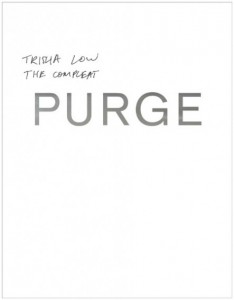A Review of Vulnerability on Trisha Low’s The Compleat Purge
 The Compleat Purge
The Compleat Purge
by Trisha Low
Kenning Editions, 2013
240 pages / $15.95 Buy from Kenning Editions or Amazon
I listen to NPR’s Morning Edition on Verdi’s 200th birthday. Soprano Sondra Radvanovsky says she loves Verdi’s operas: “People can relate, and say ‘Wow! I’m not the only person who fell in love with the wrong person,’ or ‘Oh gosh, I’m not the only person who made the wrong choice.’ Verdi makes people realize it’s OK to be human.”
This “realization” is the purge. Finger down the throat, razor from the drawer, opera on the stage. Purge. It’s OK to be human.
Trisha Low’s The Compleat Purge: a purge in three acts.
*
Act I: Low writes her last will and testament, turns a legal formality candid, into “gushy epistolaries” at age 6, then 13, 15, 17, 19, 20, 21, 23, 24. Suicide notes to her parents, to first loves, old friends, new friends, apologizing, professing undying love, willing Hitchcock DVDs, quoting from Murakami and Batman.
Low’s suicide notes are not gateways to reading her work, they’re the work itself. She’s keenly aware of Plath, Sexton, and Woolf. With Low brushing off the coup de grâce, the letters refuse ‘authentic’ truth.
Vulnerability as “elaborate conceptual joke.”
In an interview, Low quotes Joseph Kaplan: “I am interested only in the successful, annihilative manifestation of the poem, as an absolute violence.”
In John Cassavetes’ film Faces, characters pulse through impromptu sing-a-longs, threats, slaps, insults, a buzz of reverie and devastation. Overcome after cheating on her husband with the young playboy Chet, Maria downs a handful of sleeping pills. Chet finds her on the floor, tosses her in the shower, sticks his fingers down her throat, anything to wake her up, slaps her until she cries herself awake. Moment of calm. Chet lights a cigarette for her, leans back on the bed. “Nobody cares. Nobody has the time to be vulnerable to each other.”
Vulnerability as violence.
July 14th, 2014 / 10:00 am
